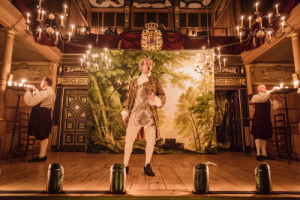Review: Farinelli and the King
|
Ellen MacDonald-Kramer [October 2015.]
My inner geek is ludicrously happy right now. As a castrati historian and enthusiast, I’m intrigued by all things related to the male treble voice, past and present. So to discover that Claire van Kampen had written a play based partially on the life of the most famous castrato was to be euphoric indeed. Farinelli and the King debuted earlier this year at the Sam Wanamaker Playhouse at Shakespeare’s Globe. Given popular demand, it’s now on for a 12-week run at the West End’s Duke of York Theatre. If you live in London (or could manage a visit before the beginning of December), I implore you: Treat yourself to a ticket. If you don’t live in London and /or don’t fancy going, I feel sorry for you. Because I adored this show. The play concerns the relationship between Carlo Broschi (known to audiences as ‘Farinelli’) and the ailing King Philip V of Spain. It’s perhaps the story best-known to anyone with an interest in castrati: how Philip, suffering from severe mental illness and incapable of attending to his monarchical duties, found consolation in the singing of Farinelli. Since I first encountered it some years ago, I’ve found the tale of Farinelli and King Philip tremendously moving. Their story has even seeped into my fiction-writing. This early example of musical healing – or music therapy – is cited often enough in opera history books, but has been surprisingly neglected in fictional media. The 1994 film Farinelli barely scratched the surface, as it focused on Carlo’s relationship with his composer-brother Riccardo (it also isn’t a fantastic film, for reasons probably best saved for another article. I’ll just say that it’s a little heavy on melodrama, cheesy / unlikely sex scenes included). Van Kampen’s play opens to a sleepless King Philip (charmingly portrayed by Mark Rylance of BBC’s Wolf Hall) delivering a monologue to his goldfish. His behaviour, by turns sorrowful and plain bizarre, is alienating his council, who have started to call for his abdication. His affectionate wife, Queen Isabella (Melody Grove) has all but given up on a cure when she hears the voice of Farinelli. Lured out of his London contract, the castrato follows Isabella back to her ailing husband in Madrid. Philip is captivated by Farinelli’s voice upon first hearing it, and his depressive state alleviated. From this point onwards, the singer’s regular performances have a stabilizing effect on the king’s condition. But far from being simply a story about the power of one man’s voice over another, Farinelli and the King looks at the tragedy common to these two men: Philip and Farinelli are both trapped in roles not of their own choosing. As van Kampen puts it: “My play is just that: the relationship between two men who have been unnaturally elevated to kingship; both have been damaged in the process and feel their entitlement to be unnatural.” The role of Farinelli is acted and sung separately, his spoken dialogue delivered by Sam Crane and his arias by one of three countertenors (Owen Willetts in the matinée I saw). It was a casting decision that at first struck me as odd; why not cast a single countertenor to sing and speak? But the effect grew on me, and there was something quite eerie in the idea of the voice being somehow disembodied. Castrati voices, although we don’t know how they sounded (the only recording of a castrato dates from the early 1900s and is not a good example), are thought to have been bizarre and ethereal, and may well have possessed such a quality of ‘otherness.’ Willetts has a luscious voice and I much enjoyed his performance. Whilst the typical countertenor voice is itself not closely related to the castrato voice, its effect is, nevertheless, appropriately jarring. Most countertenors achieve their sound by singing in falsetto: contrary to its Italian name, a perfectly natural register in the voice of the fully developed, uncastrated man. Manly as the countertenor voice might be in that sense, it’s not a sound one expects to come out of a man. Nor is it a womanly voice – which is why, for Farinelli, it works. Among the play’s other treats are a trio of Baroque instrumentalists, and sumptuous 18th-century costumes and sets, complete with burning candles. There’s one particularly fun scene in which a singing Farinelli descends over the stage on a rope, ostrich feathers sprouting from his head: a humorous reference to the ostentation of the opera seria genre. Sprinkled through the script are bits of modern dialogue; we get “Opera singers – bunch of tossers” and even “Can we go watch the rugby now?” (Yep.) It’s eccentric and playful, yes, but that never trumps the serious undertone. A line of the king’s stays with me the most: “His voice reminds me that it’s possible to live in a world like this.” I’ve bought a ticket to see it again. [Iestyn-Davies singing in Farinelli and the King. Photo by Marc Brenner. Retrieved from http://blog.shakespearesglobe.com/.] [More Ellen MacDonald-Kramer]
[Previous Article:
EA Bucket 22: Including Solo Instruments]
[Next Article:
Snapshots: </br>Serenity, Perturbed – Aribert Reimann]
|
